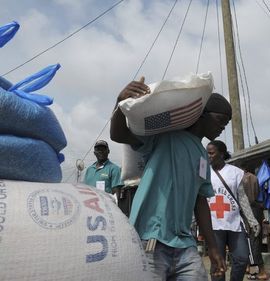U.N. says $600 million needed to tackle Ebola as deaths top 1,900
The United Nations said $600 million in supplies would be needed to fight West Africa’s Ebola outbreak, as the death toll from the worst ever epidemic of the virus topped 1,900 and Guinea warned it had penetrated a new part of the country. The pace of the infection has accelerated, and there were close to 400 deaths in the past week, officials said on Wednesday. It was first detected deep in the forests of southeastern Guinea in March. The hemorrhagic fever has spread to Liberia, Sierra Leone, Guinea, Nigeria, and Senegal, and has killed more people than all outbreaks since Ebola was first uncovered in 1976. There are no approved Ebola vaccines or treatments. An experimental Ebola vaccine that Canada said it would give to the World Health Organization for use in Africa was as of Wednesday still in the lab that developed it as officials are puzzled over how to transport it.
We are now working with the WHO to address complex regulatory, logistical and ethical issues so that the vaccine can be safely and ethically deployed as rapidly as possible.
Health Canada spokesman, Sean Upton
The United Nations said on Tuesday the spread of the deadly Ebola virus in West Africa was causing food shortages in one of the world’s poorest regions and the U.S. Centers for Disease Control and Prevention warned the disease was threatening the stability of stricken countries and their neighbors. Doctors in Liberia were out on strike as they struggled to cope with the worst outbreak of Ebola on record, while the global aid organization Medecins Sans Frontieres (MSF) said 800 more beds for Ebola patients were urgently needed in the Liberian capital Monrovia alone, while in Sierra Leone highly infectious bodies were rotting in the streets. Governments and aid organizations have scrambled to contain the disease, which according to the World Health Organization (WHO) has killed more than 1,500 in West Africa since March.
We are now working with the WHO to address complex regulatory, logistical and ethical issues so that the vaccine can be safely and ethically deployed as rapidly as possible.
Sean Upton, Health Canada spokesman
Dr. David Nabarro, senior U.N. Coordinator for Ebola, said the cost of getting the supplies needed by West Africa countries to control the crisis would amount to $600 million. That was higher than an estimate of $490 million by the WHO last week. Moving workers and supplies around the region has been made difficult by restrictions by some countries on air travel and landing rights as they try to control Ebola’s spread. Ivory Coast, which closed its borders with Liberia and Guinea last month, said on Tuesday it would open humanitarian and economic corridors to its two western neighbors.
We are working intensively with those governments to encourage them to commit to the movement of people and planes and at the same time deal with anxieties about the possibility of infection.
Dr. David Nabarro, senior U.N. Coordinator for Ebola

Health ebola